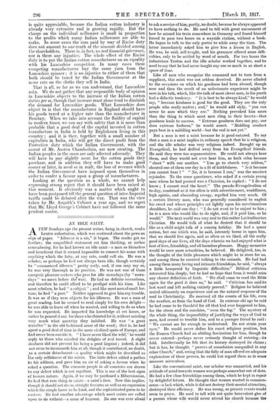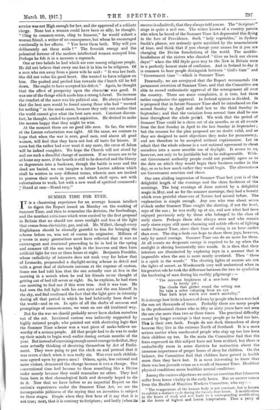AN IDLE SAINT.
AFEW Sundays ago the present writer, being in church, read a Lenten exhortation, which was scattered about the pews on slips of paper. " Idleness is a sin," it began. The reader got no further; the unqualified statement set him thinking, or rather remembering, for he had known an idle saint-- a man so blameless and beneficent that it• seemed impossible to connect his name with anything which the laity, at any rate, could call sin. He was a scholar, so perhaps he had not always been idle, though certainly lie " commenced idleness " pretty early, and, if one may say so, he was very thorough in its practice. He was not one of those energetic pleasure-seekers who pass for idle nowadays (by " nowa- days " we mean before the war). He had no definite recreations, and therefore he could afford to be prodigal with his time. Like most scholars, he had " a subject " ; and like most men of small for- tune, he had " a post." Neither appeared to give him any trouble. It was as if they were objects for his idleness. He was a man of great reading, but he seemed to read simply for his own delight— lie was able to leave off when ho wanted, and willing to do so when lie was requested. He imparted his knowledge at set hours, or rather he poured it out for those who thirsted for it, without minding very much what quantity they imbibed. He was " a great traveller " in the old-fashioned sense of the word ; that is, he had spent a good deal of time in the more civilized spots of Europe, and had never been outside it. " I have never liked the wild," he would reply to those who extolled the delights of real travel. A slight deafness did not prevent his being a good linguist ; indeed, it did not seem to incommode him at all, though it contributed, no doubt, to a certain detachment—a quality which might be described as the only selfishness of the saints. The little defect added a pathos to his address, and gave him an air of asking a favour when he asked a question. The common people in all countries are drawn to any defect which is not repellent. This is one of the best signs of human nature. Again, if we may be pardoned a Hibornianism, he had that rare thing iu saints—a saint's face. Now this implies, though it should not do so, straight features as well as an expression which the simple know to be kind, and the sophisticated guess to be austere. He had another advantage which most saints are called upon to do without—a sense of humour. No one was ever- afraid to ask a service of him, partly, no doubt, because he always appeared to have nothing to do. He used to tell with great amusement of how he missed his train somewhere in Germany and found himself forced to pass two hours on a wayside station, without a book. He began to talk to the only porter to while away the time. The latter immediately asked him to give him a lesson in English. He was, he said, self-taught, and his grammar offered some diffi- culties, only to be settled by word of mouth. For two hours the industrious Teuton and the idle scholar worked together, and he used to say that he had never taught any one so much in so short a
space of time. .
Like all men who recognize the command not to turn from a suppliant, this saint was not seldom deceived. He never alluded to the occasions on which his goodness had been abused, though now and then the result of an unfortunate experience might be seen in his talk, which, like the talk of most clever men, in his youth had a didactic tendency. " It is best to be always kind," he would say, " because kindness is good for the good. They are the only people who really matter ; and," he would add slyly, "you can never be sure which they are." Nothing provoked him more than the thing to which most men cling in their hearts—that goodness leads to success. " Extreme goodness does not pay, nor does extreme badness," he would assert. "Middling conduct pays best in a middling world—but the end is not yet."
But a man is not a saint because he is good-natured. To say that a man is a saint implies in ordinary speech that he is religious, and the idle scholar was very religious indeed. Brought up an Evangelical, he had drifted away from his Evangelical friends. He said they were too argumentative. He could not always hear them, and they would not ever hear him, so both sides became " short " with one another. You go to church very seldom," shouted one of them one day in a fit of faithfulness. " Is it because you cannot hear ? " " No, it is because I can," was the succinct rejoinder. To the same questioner, who asked if a certain young man whom he had praised was a Christian, he replied : " I do not know ; I cannot read the heart•." The pseudo-Evangelicalism of to-day, combined as it too often is with advertisement, worldliness, high spirits, and abounding energy, repelled him very much. Of a certain literary man, who was generally considered to exploit his creed and whose principles sat lightly upon his sanctimonious shoulders, ho said one day : " I do not want to be unjust to him ; he is a man who would liko to do right, and, if it paid him, so he would." The next world was very real to this rather Latitudinarian Christian. He would talk of what he desired that it should be like as a child might talk of a coming holiday. He had a queer notion, but one which was, he said, intensely borne in upon him, that we should live again, and as often as we liked, all the really good days of our lives, all the days wherein we had enjoyed what is best of love, friendship, and all harmless pleasure. Happy memories would be once more actualities, he believed. He delighted, too, in the thought of the little pleasures which might be in store for us, and among them he counted talking to the animals. He had had among them many loving and intimate friendships, he said, " always a little hampered by linguistic difficulties." Biblical criticism interested him deeply, but he had no hope that from it would arise
any clearer definition of faith. We shall come to read the Bible again for the good it does us," he said. " Criticism has said its last word and left nothing entirely proved." Religion he believed rested ultimately on experience and on the natural response of the soul to Christianity. He received all the events of his life, even the weather, as from the hand of God. In extreme old age he said he had come to be thankful for all that had ever happened to him, for the storm and the sunshine, " even the fog." The mystery of the whole thing, the impossibility of justifying the ways of God to man, had ceased to trouble him, and to a younger friend he said : " We cannot see far enough to understand. Do not strain your eyes." Ho would never define his exact religious position, but the Roman Church had an abiding fascination for him, though he never entered—perhaps never seriously thought of entering—its fold. Intellectually he felt that its history destroyed its claims ; but it has, he thought, " powers of consolation unequalled in any other Church," and, seeing that the folly of man offered no adequate explanation of these powers, he could but regard them as in some measure miraculous.
Like the conventional saint, our scholar was unmarried, and his attitude of mind towards women was perhaps somewhat out of date. He had a few close friendships among them, which he kept in repair by delightful letters. He thought that women wanted in common. sense—a lack which, while it did not destroy their mental attraction, destroyed their efficiency. He was wrong, as present events would seem to prove. He used to tell with not quite benevolent glee of a parson whose wife would never attend his church because the
service was not High enough for her, and she approved of a celibate clergy. None but a woman could have been so silly, he thought. " Cling to common-sense, cling to humour," he would exhort a woman friend, a writer of no consequence, but whom he encouraged continually in her efforts. " You have them both. Why will you deliberately set them aside ? " The feverish energy and the polemical fervour of the modern intellectual woman annoyed him. Perhaps he felt it in a measure a reproach.
One or two beliefs he had which are rare among religious people. He did not believe that every one has it in him to be religious. Of a man who ran away from a pious wife he said : " It was her fault. She did not value L6 good heart. She wanted to force religion on him. She pushed and pushed him towards the Church till he fell down. She ought to have accepted his defect." Again, he thought that the effect of prosperity upon the character was good. It was one of the things which made him a strong Liberal. To increase the comfort of the mass was his political aim. Ho always believed that the best men would be found among those who had " wanted for nothing " in the usual sense, because they only can realize that the world cannot give what the best men want. Constant discom- fort, he thought, tended to quench aspiration. He desired to make the masses happy that they might be wise.
At the moment there are no good idle men. So far, the writer of the Lenten exhortation was right. All the same, we venture to hope that when the war is over, good men, and above all good women, will find that they have not lost all taste for leisure. If none but the rather bad ever want it any more, the curse of Adam will be indeed complete. We hope the Church will not stand by and see such a dreadful change of manners. If no women are to be at home any more, if the hearth is still to be deserted and the library to degenerate into a bookcase, though the battle is over and the dead are buried, we can imagine a future Lenten address which shall be written in very different terms, wherein men are invited to possess their souls in peace, and which shall open, not with exhortations to work, but with a new word of spiritual command : Stand at ease—Stand easy."



































 Previous page
Previous page